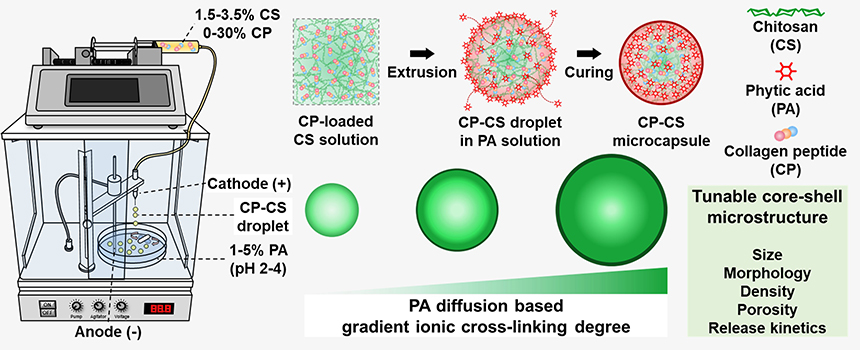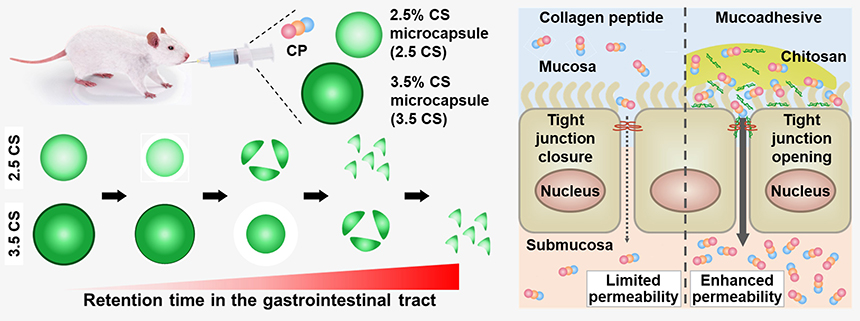An Edible Collagen Capsule Showing Groundbreaking Improvements in Dermal Delivery
Professor Young Hoon Roh’s laboratory develops an edible collagen capsule
showing groundbreaking improvements in dermal delivery
Mucoadhesion in the digestive tract, sustained release, and tight junction opening
Exhibits an eight-fold longer retention time compared to existing edible collagen
The laboratory of Professor Young Hoon Roh, in the Department of Biotechnology, College of Life Science and Biotechnology, collaborated with Professor Ki Young Choi from Gangneung-Wonju National University to successfully develop collagen microcapsules that represent a revolutionary improvement in existing rates of dermal delivery and retention time. This study is expected to lead to the development of products that can maximize skin improvement effects while minimizing collagen intake.
Recently, society’s awareness with regards to physical aesthetics has increased. As a result, the market for so-called edible cosmetics, based on the idea of developing external beauty by maintaining a healthy interior, has shown rapid growth. In fact, in South Korea, the domestic “inner beauty” market has shown annual growth rates of over 18%, and is forecast to achieve a size of 2 trillion won by 2025 (Shinhan Securities Research Center). As such, various inner beauty products, including edible collagen, are being launched and sold as functional or supplementary foods.
Human skin is comprised of collagen, hyaluronic acid, and elastin. Collagen synthesis begins to decrease by around 1% per year from our early twenties, and rapidly decreases after our forties. In a bid to prevent skin aging, external sources of collagen can be consumed. Recently, techniques have been developed to increase the absorption of collagen into the body. This includes via its dermal delivery using hydrolysis to convert macromolecular collagen into micromolecular collagen peptides, thereby increasing the concentration of the main constituent of collagen, GPH (glycine-proline-hydroxyproline). Once delivered to the skin, the collagen peptides help to improve the skin’s appearance by maintaining its elasticity and hydration. However, the short retention time of orally ingested collagen in the digestive tract has been a limiting factor, leading to a large amount of collagen being excreted rather than absorbed into the body.
To overcome this limitation, in the present study, the authors applied existing edible collagen peptides to microcapsules that can be loaded into hydrogels via ionic gelation and electrostatic extrusion. The synthesis of chitosan capsules via ionic gelation is both simple and economical. These capsules exhibit increased absorption into the body via the processes of mucoadhesion, sustained release, and tight junction openings in the small intestine. Despite these advantages, the stable loading of compounds like collagen peptides during processing has often been hampered due to their low-molecular weight and highly solubility.
To address these problems, rather than use a conventional ionic crosslinking agent, such as sodium tripolyphosphate, the researchers used phytic acid, a faster, stronger crosslinking agent, to synthesize the collagen microcapsules. By optimizing the conditions for capsule synthesis, including the concentrations of chitosan, collagen, and phytic acid, and the pH of the phytic acid solution, the researchers were able to stably load a high concentration of collagen peptides (≥70% loading efficiency). By regulating the ionic crosslinking, they were able to alter the size, shape, density, and porosity of the capsules.

[Figure 1. Schematic representation of the synthesis of controllable sustained-release collagen microcapsules via ionic crosslinking regulation]
To evaluate the changes in the retention and absorption of the collagen microcapsules with varying concentrations of chitosan, the researchers selected capsules with two different chitosan concentrations and analyzed their release dynamics, pharmacokinetics, and retention time in the digestive tract.
Due to mucoadhesion, both capsules remained in the environment of the digestive tract longer than raw collagen peptides. In addition, the sustained release of collagen peptides was observed proportionally to the chitosan concentration, with chitosan also inducing the opening of tight junctions between intestinal epithelial cells, resulting in an increase in the retention of up to 8-fold. In addition, compared to raw collagen peptides, the collagen microcapsules showed 1.5-, 3.4-, and 8-fold increases in retention time in blood (AUC), peak serum concentration (Cmax), and time to reach peak concentration (tmax).
Additionally, to identify the mechanisms underlying the increased absorption and retention time due to mucoadhesion and sustained release, the researchers loaded the microcapsules with a fluorescent marker before oral administration in an animal model. The tracking of the fluorescent markers showed that oral administration in microcapsule form resulted in a longer retention time in the small intestine compared to the administration of raw ingredients, as well as a delay in its excretion.
Furthemore, the collagen peptides inside the newly developed collagen microcapsules were not structurally degraded in artificial digestive fluids or serum, maintaining their physiological activity. In addition, the capsules did not cause significant toxicity to neither intestinal epithelial cells nor skin cells, and showed improved anti-UVB aging and antioxidative effects compared to the raw ingredients.
In conclusion, the collagen microcapsules deliver more collagen peptides to the skin due to increased absorption in the gut, which could result in substantial skin improvements via anti-photoaging and antioxidative effects, the maintenance of skin elasticity, and skin hydration. In particular, the sustained release of collagen peptides and increased absorption could be easily adjusted by changing the concentration of chitosan in the capsules. This suggests that the capsules can be set up to suit specific recommended intake levels or intake cycles.

[Figure 2. Diagram showing the sustained release and increased absorption of the collagen microcapsules
in the digestive tract]
Professor Roh explained the importance of the study, stating, “By increasing the retention time of edible collagen peptides in the digestive tract, this study has produced a revolutionary enhancement in absorption and dermal delivery. Since the collagen microcapsules we developed can be mass-produced in various forms, including powders, liquids, and jelly, and can be applied to various health functional food products, we expect that they will be commercially applicable in the fields of bio-health and inner beauty.”
Moreover, Wonkyu Yu, Chief of Research and Development at Yonsei University Dairy, stated, “Development of products using the collagen microcapsules is currently underway, and we have plans to launch a dermatologically functional health-promoting fermented milk product in the first half of 2024.”
This study was published in the January 2024 issue of the Journal of Controlled Release (IF 11, top 3% in JCR Pharmacy), a leading international journal in the fields of Pharmacy and Pharmacology, recognizing the study’s excellence and originality. om Yonsei University, researcher Kyungjik Yang was the co-first author alongside Dr. Hwa Seung Han from Gangneung-Wonju National University. Students Seung Hwan An and Kyung Hoon Park, Dr. Keonwook Nam, student Shinha Hwang, researchers Yuyeon Lee and Sung Yeon Cho, and Dr. Taehyung Kim from Yonsei University, Professor Deokyeong Choe from Kyungpook National University, researcher Sang Won Kim and Chief of Research and Development Wonkyu Yu from Yonsei University Dairy, Professor Hyunah Lee from Dongyang Mirae University, Chief of Research Jiyong Park from Nutrex Technology, and Professor SangGuan You from Gangneung-Wonju National University participated as co-authors. Professors Dong-Gyu Jo and Jae Hyung Park from Sungkyunkwan University, Professor Ki Young Choi from Gangneung-Wonju National University, and Professor Young Hoon Roh from Yonsei University particiated as correspondong authors.
Find out more:
Title of original article: Mucoadhesive chitosan microcapsules for controlled gastrointestinal delivery and oral bioavailability enhancement of low molecular weight peptides
DOI: https://doi.org/10.1016/j.jconrel.2023.10.021
Journal: Journal of Controlled Release
Contact corresponding author: Prof. Young Hoon Roh (yr36@yonsei.ac.kr)
Recommended Articles
Professor Myeong Min Lee
A QUIRKY twist of fate: understanding epidermis cell differentiation in plants
Professor Jihyun F. Kim
Microbial Mercenaries for Plant Disease Resistance Ungrounded